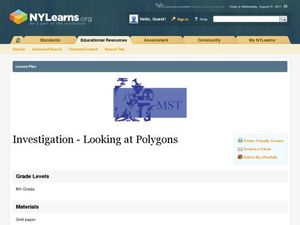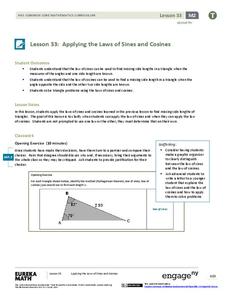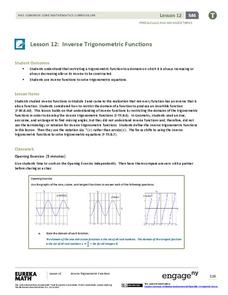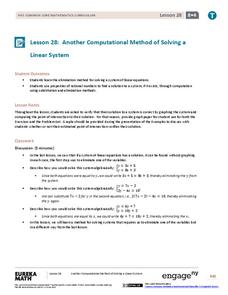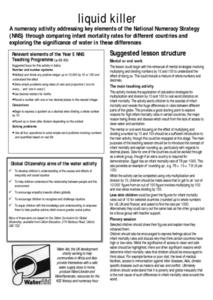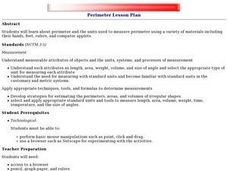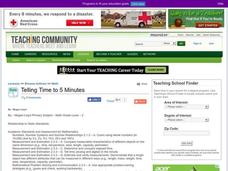Safe Drinking Water Foundation
Making a Difference
After learning about the effects of water pollution, your class will discuss ways to make people in their community aware of the importance of water conservation. Then, your young environmentalists will write a letter to the local...
Curated OER
The Language Garden
Students explore threats to minority languages. In this global studies lesson, students read an article about minority languages in the world. Students then complete tasks to show their comprehension of the article. The reading is not...
NY Learns
Investigation - Looking at Polygons
Middle schoolers construct polygons by plotting points on a coordinate plane. Pupils connect the points and identify which polygons they have drawn. They will need graph paper to carry out the assigned activities. A vocabulary list,...
Chicago Botanic Garden
Weather or Not
What is the difference between weather and climate? This is the focus question of a instructional activity that takes a deeper look at how weather data helps determine climate in a region. Using weather and climate cards, students decide...
Science Matters
Plot Study
Small groups investigate plots of land to discover how abiotic and biotic factors interact. After recording their findings, scholars share observations with peers and self-reflect on the learning process.
Curated OER
Yummy Math
Young mathematicians use bags of Skittles to help them gain practice in graphing and organizing data. They work in pairs, and after they have counted and organized their Skittles, they access a computer program which allows them to print...
Curated OER
Solar Kit Lesson #11 - Power Maximum: An Electrical Determination
Collaborative groups connect resistors and solar panels in series and measure electrical resistance, voltage, and current. The objective is to order 16 solar panels from strongest to weakest. They graph current-voltage and power curves...
Nuffield Foundation
Measuring the Rate of Metabolism
Plant respiration can be a difficult concept for young biologists to grasp; with a hands-on lab, learners can collect and graph data, then calculate the metabolism rate for the plants they studied. If you do not have a respirometer,...
EngageNY
Applying the Laws of Sines and Cosines
Breaking the law in math doesn't get you jail time, but it does get you a wrong answer! After developing the Law of Sines and Cosines in lesson 33 of 36, the resource asks learners to apply the laws to different situations. Pupils must...
EngageNY
Inverse Trigonometric Functions
Build on the understanding of finding angles using trigonometric ratios. Pupils develop the definitions of inverse trigonometric functions by restricting their domains in the 13th lesson of a 16-part series. They use inverse functional...
EngageNY
Another Computational Model of Solving a Linear System
The process of elimination really works! Use elimination when substitution isn't doing the job. The 29th segment in a series of 33 introduces the elimination method to solving linear systems. Pupils work several exercises to grasp the...
Curated OER
Unit 2 Sun & Stars
Students describe stellar objects using terms such as stars, planets, satellites, orbits and light. In this sun and stars unit, students research stellar objects through seven individual lessons discovering star characteristics, how...
Curated OER
Circumference of a Pumpkin
Fourth graders watch a video and find the circumference of a pumpkin. In this circumference lesson, 4th graders watch a video to help them find the circumference of their pumpkins. Students define the word circumference on their data...
Curated OER
Regrouping
Students practice regrouping using the wonderful manipulative - unifix cubes. Once they have a tactile understanding of regrouping, students complete 5 worksheets containing addition problems that require regrouping. The worksheets...
Curated OER
Liquid Killer
Students explore number sense applications and discuss strategies for multiplication and division using mental math. For cross-curricular purposes, they explore causes and effects of inequality and social injustice. Students explore...
Pennsylvania Department of Education
Extending Pattern Understandings
Young scholars use shapes and manipulatives to demonstrate patterns. In this patterns lesson plan, students also break up patterns to identify a pattern unit.
Curated OER
Mapmakers' Perspective
Students examine several maps and consider mapmakers' perspective in early depictions of North America.They determine how the spherical shape of the earth makes any north-south and east-west orientation a matter of perspective. For...
Curated OER
M & Ms in a Bag
Students make predictions about the number and colors of M&M's in a snack size package. They create an Excel spreadsheet to record the data from their small group's bag, create a graph of the data, and discuss the variations of data...
Curated OER
Balancing
Students use a balance to complete subtraction problems and weigh out the items they take away. In this subtraction lesson plan, students use a pan balance and record their equations.
Curated OER
Fractions in Clay
Students represent and explain fractions as part of a set using modeling clay. They create sets of objects as specified by individual task cards.
Curated OER
Perimeter
In this perimeter worksheet, students, with a partner, problem solve and calculate the answers to twenty word problems and mathematical calculations involving perimeters.
Curated OER
Fraction Conversion Lesson Plan
Students practice converting fractions into decimals and percents using a computer applet and the concept of money.
Curated OER
Telling Time to 5 Minutes
In this second grade lesson your class will practice telling time. The goal is to tell time to five minutes using an analog clock. Your young students count by 5 minute intervals and discuss elapsed time.
ESL Kid Stuff
Measuring Parts of the Body
"How tall are you?" "Who has the longest arms?" As part of a study of the names of various body parts, language learners use rulers and tapes to measure parts of the body.




